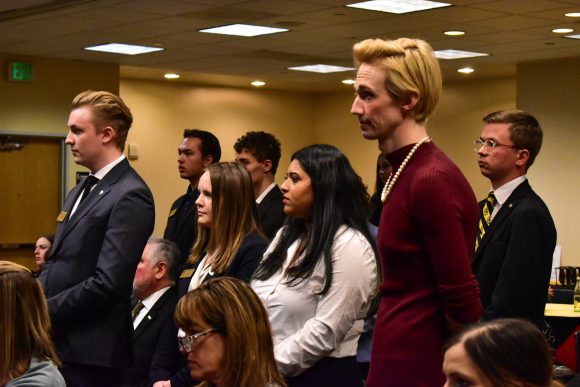
Rachel Hill, University of Colorado Boulder Student Government tri-executive, speaks at public comment at the CU Board of Regents meeting on Feb. 9, 2023 to call for a response to her resolution to ban concealed carry. (Isabella Hammond/CU Independent)
Editor’s note: This story contains descriptions of gun violence.
In a room of seated university officials, Rachel Hill walks to the podium at the center of attention. As she urges the CU Board of Regents to ban concealed carry on campus, members of the University of Colorado Boulder Student Government (CUSG) stand in the back of the room with their hands clasped.
It was a moment months in the making.
On Oct. 6, 2022, Hill celebrated the unanimous approval of her resolution 97 LCR 05, calling on the regents to ban concealed carry across all four CU campuses. Then, on Feb. 9, 2023, she stood with gun violence prevention advocates and other members of CUSG to call on the regents to respond to her legislation.
Here’s how that came to be:
A precedent of firearm prohibition on CU campuses
In the 1960s, student activism became a key feature of the civil unrest in response to the Vietnam War. At the same time, violent political protests from the Weather Underground Organization, a domestic terrorist group that organized bombings to display opposition to the war, and the assassinations of prominent figures like Malcolm X and Martin Luther King, Jr. populated news headlines.
Closer to home, an Air Force ROTC office at the University of Colorado Colorado Springs (UCCS) was bombed on March 1, 1970. Around the same time, several hundred Boulder students disapproved of the ROTC training on CU campuses in connection with the Vietnam War. In April, they marched from the University Memorial Center to the Regent Administrative Center and camped in the building until police threatened them with arrest.
A month later, on May 16, 1970, the CU Board of Regents prohibited the possession of firearms on campus.
In March 1994, the regents upheld that decision with Regent Policy 14-I, banning concealed carry on all CU campuses.
Increase in gun rights activism changes precedent
At the state level, Colorado passed the Concealed Carry Act (CCA) on March 18, 2003. The bill allowed permit holders to carry a concealed firearm throughout the state, except in public primary and secondary schools, buildings with fixed security checkpoints and places where federal law prohibits concealed carry.
Later that year in June, then-Attorney General Ken Salazar published a formal opinion stating that the CCA did not limit the power of the regents to govern campus firearm bans.
“Colorado’s constitution and statutes authorize the regents to govern the University’s internal affairs,” Salazar wrote in the opinion, later saying, “Any statute enacted by the General Assembly to narrow this authority must expressly limit the power of the regents.”
Though his opinion was non-binding, the regents continued to uphold the ban until it was met with resistance.
Students for Concealed Carry on Campus (SCCC), a gun rights advocacy group, filed a complaint in 2008 when students from UCCS and CU Denver wanted to carry handguns on campus for self-defense. SCCC lost in the El Paso County District Court, appealed, and won in the Colorado Supreme Court in March 2012.
The court in Regents v. SCCC held that the CCA stripped the regents of their authority to ban concealed carry on campuses. The ruling forced the regents to strike down the ban, allowing students to possess a firearm on campus if they had a permit.
Surrounding the case were events related to firearm violence, most notably the 2012 Aurora mass shooting at a Century 16 movie theater. The New York Times reported on unrest and nervousness among CU Boulder faculty, and CU Boulder Chancellor Philip DiStephano responded to the concerns highlighted across media outlets.
“I […] believe we have a safe campus, one of the finest police forces in the country and a conscientious faculty of integrity, talent and commitment,” DiStephano said in the press release. “We need to trust in these things and in one another while continuing to be vigilant about safety procedures and practices.”
Today, Colorado is one of 12 states that allow guns on college campuses by law, according to Armed Campuses.
Discontent and mass violence spark reform
Since 2012, CU Boulder students and faculty have repeatedly protested gun violence within the Boulder community.
In 2018, roughly 200 CU Boulder students participated in the National School Walkout Day to protest gun violence, some calling for an effort to reinstate the concealed carry ban and overturn the decision from 2012. Then in 2021, CU Boulder students and Boulder community members rallied for increased gun control a week after the shooting at the Table Mesa Drive King Soopers in March.

Students attending the March 29th, 2021 Students Demand Action rally sign their names on a banner that will be sent to senators in Washington D.C.. (Io Hartman/CU Independent)
Then in June 2021, Gov. Jared Polis signed three gun reform bills into law. This included SB21-256, a bill that declared the regulation of firearms “a matter of state and local concern” and gave local governments the ability to enact their own gun laws and regulations. With the reasoning of the Regents v. SCCC ruling overturned, the bill gave the regents the authority to enact a concealed carry ban.
“As local governments consider additional firearm laws, they must focus on prospective applications that protect existing rights, serve the community and keep Coloradans safe,” Polis wrote when he signed the bill into law.
CUSG defends the case for a renewed ban on concealed carry
Before SB21-256 passed, CUSG passed 95 LCR 01, a resolution supporting the bill and calling on the regents to reinstate the concealed carry ban upon its passing.
However, the recent effort to revitalize the bid for a ban in the fall 2022 semester has gained the attention of multiple Colorado media outlets, and it started with Hill.
Hill attended Columbine High School roughly 16 years after the 1999 shooting. Gun violence prevention and awareness, Hill said, were very present in the community even years later. She began her activism in 2018 after the shooting at Marjory Stoneman Douglas High School in Parkland, Florida. She led walkouts, joined protests and advocated for policies like extreme risk protection orders throughout her time in high school.
Hill got back into gun violence prevention advocacy after the 2021 King Soopers shooting.
“I was getting gas at King Soopers when it happened, and even that event itself was traumatic, and I feel like I’ve been deeply impacted by gun violence in several ways at this point,” Hill said in an interview with the CU Independent.
In fall 2022, 97 LCR 05 started to make its way through CUSG. The resolution called on the regents to ban concealed carry across all four CU campuses. CUSG legislative council passed the resolution unanimously on Oct. 6 after first reading, leaving it up to the regents to respond.
Initial hopeful estimates placed the passing of a potential concealed carry ban policy early in spring 2023. After the last regular board meeting in November 2022 ended without an official response from the regents, CUSG began planning for a harder push at the next meeting in February 2023.
On Feb. 9, Hill, fellow CUSG members and representatives from Moms Demand Action and Team Enough, two gun violence advocacy groups, packed the board of regents meeting, calling for a response to 97 LCR 05.

Members of the University of Colorado Boulder Student Government stand together as they take turns speaking at the CU Board of Regents meeting on Feb. 9, 2023. (Isabella Hammond/CU Independent)
“A few months ago, I sent you all a resolution supported by undergraduates, graduate students, staff and faculty urging you to ban concealed carry across the CU system,” Hill said to the regents during her public comment. “But the response that we received did not exemplify courage to me.”
Hill ended with the question: “If it just saves one life, isn’t it worth it?”
Lesley Smith, the board chair, referred the issue to the University Affairs Committee for its next meeting in April.
CU President Todd Saliman thanked the students for sharing their thoughts with the board and said that he looked forward to speaking with university affairs on the issue.
“Safety is a paramount priority for all of us, for the entire board of regents, for the chancellors and for me,” Saliman said after the public comment period.
Looking to the future
Now that the resolution has been passed to university affairs for discussion, the regents have begun the process of deciding whether or not to renew a ban on concealed carry. The next committee meeting is set for April 18. The agenda and Zoom link will post to the board of regents website closer to the meeting.
If university affairs decide to pass the issue to the full board, the earliest a ban could be voted on would be at the regular meeting on April 27.
The regents on that committee are Democrat Callie Rennison, Republican Vice Chair Ken Montera, Democrat Wanda James and Republican Mark VanDriel. The policy change would need to pass through them before getting a chance at a vote with the full board.
It’s difficult to know how that will play out in committee without public comments on the issue of gun rights from the regents. Here’s the information available so far: James has a history of advocating for gun rights and safety as one of the founders of the 1770 Armory and Gun Club. Additionally, Rennison has experience as a past research partner for Colorado gun crime reduction in 2013. She also received an endorsement from Blue Rising Together, a Colorado PAC with a special interest in gun safety issues.
Party affiliation is not a clear indicator of where the regents may side on this issue either, especially with a history of general bipartisan support for a ban on concealed carry. According to archived election records, the 1970 board of regents included four Republicans and two Democrats when they unanimously passed the initial amendment to prohibit the possession of firearms on CU campuses.
“It’s a very contentious issue, but I think that if [the regents] hear from enough stakeholders; students, both undergrad and graduate; staff and faculty across the four campuses, I think that we have the real power to sway them,” Hill said.
Contact CU Independent News Editor Isabella Hammond at isabella.hammond@colorado.edu.
